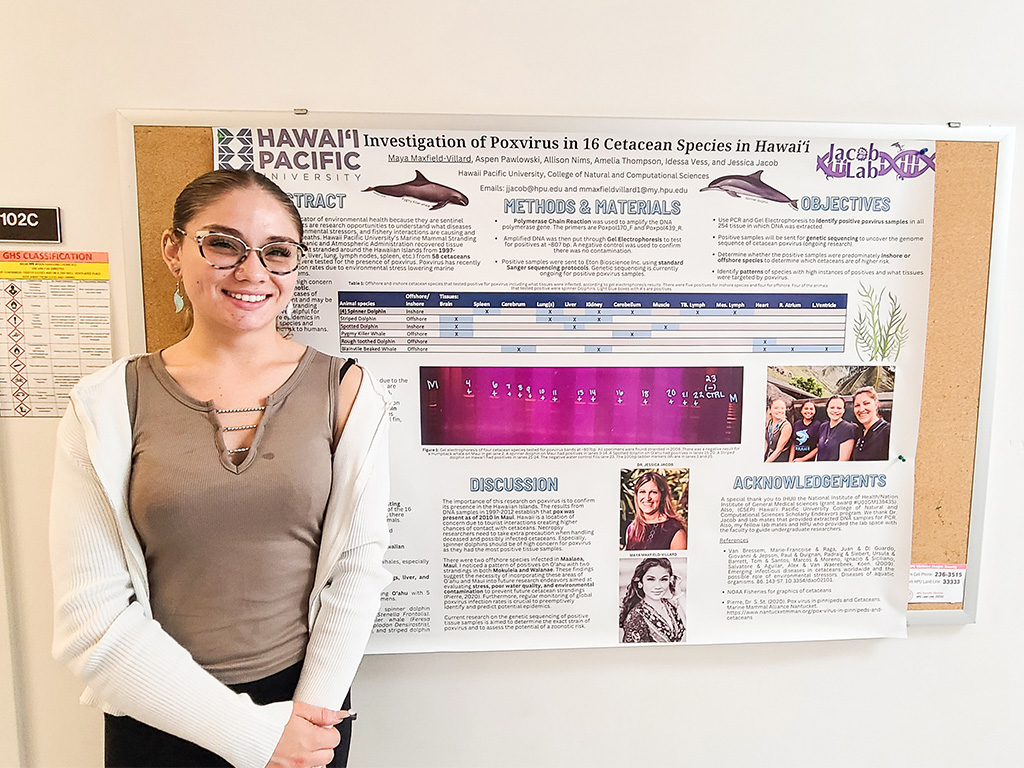
HPU student Maya Maxfield Villard with her research poster on cetacean poxvirus.
A recent study led by HPU undergraduate student Maya Maxfield Villard and overseen by HPU Visiting Assistant Professor of Biology Jessica Jacob, Ph.D., has brought to light new findings on cetacean health in the waters surrounding Hawai’i. The notable advancement in marine biology focuses on the investigation of poxvirus among 16 cetacean species found stranded on various Hawaiian beaches, providing invaluable insights into the health of these vital marine inhabitants and the broader implications for environmental well-being.
Research includes extensive testing of 58 cetaceans, including whales and dolphins. The team meticulously analyzed 190 tissue samples across a range of organs to detect the presence of poxvirus, a pathogen with known zoonotic capabilities, raising concerns about its potential to affect both animal and human health.
Findings revealed that out of the total samples, 31 tested positive for poxvirus. The distribution of these cases across Maui and O’ahu underscores the geographical breadth of the issue and highlights the necessity for ongoing surveillance and research in these areas.
The study indicated a notable prevalence of poxvirus in spinner dolphins, a species frequently found near human activities, underscoring the critical intersection between cetacean health and human environmental impact.
“It is an important time for up-and-coming scientists to choose research that will contribute to conserving our oceans and endangered species,” Villard said. “Research is important to me as it allows me to be a part of something bigger than myself. Professor Jacob has pushed me to further my academic experience by helping me tackle real-world science early in my career. Hawai’i Pacific University is lucky to have a professor who can maintain teaching while providing an abundance of research opportunities for her students.”
The research team’s efforts extend beyond the identification of poxvirus presence, as they continue to work on sequencing DNA from the positive samples. This further analysis is aimed at understanding the genetic makeup of the virus, which is crucial for assessing its zoonotic potential and formulating strategies to mitigate its spread.
This study not only contributes significantly to the scientific community’s understanding of marine mammal health but also emphasizes the importance of marine conservation efforts. Cetaceans, as sentinel species, offer a glimpse into the overall health of marine environments, making research in this area critical for environmental conservation.
“I really enjoy working with the undergraduate research students, such as Maya, in the lab. This study highlights both the importance of discovering and characterizing viral diseases in wildlife and training the next generation of scientists,” Jacob said.
The research by Villard, with the guidance of Jacob, highlights the significant impact of academic research on real-world environmental issues. HPU continues to be at the forefront of marine biology research, providing valuable opportunities for students to engage in meaningful scientific inquiry and contribute to the preservation of marine biodiversity.
HPU’s commitment to combining rigorous academic research with conservation efforts underscores the institution's role in addressing some of the most pressing environmental challenges facing marine ecosystems today.


